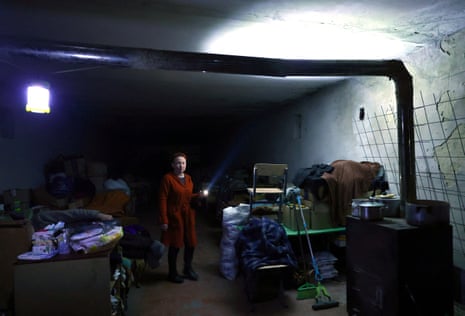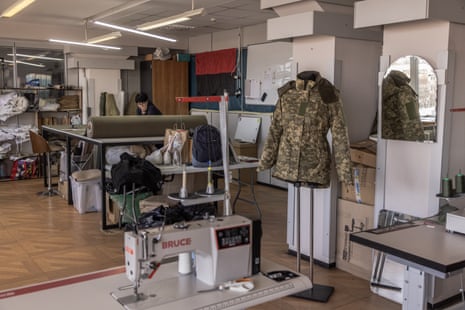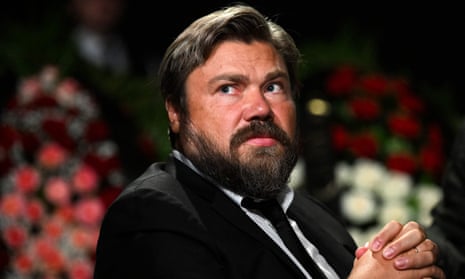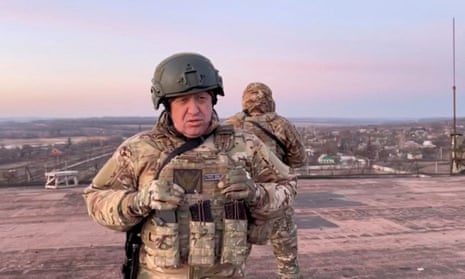Zelenskiy pledges to defend Bakhmut despite rumours of retreat
The Ukrainian president has doubled down on the defence of Bakhmut despite rumours of an imminent retreat from the besieged city that has endured a nine-month assault.
During his evening address on Monday, Volodymyr Zelenskiy said he had met senior generals where they indicated their support for continuing the defence.
I told the chief of staff to find the appropriate forces to help the guys in Bakhmut. There is no part of Ukraine about which one can say that it can be abandoned.
After a series of meetings with Zelenskiy, Valerii Zaluzhnyi, the commander-in-chief of the armed forces, and Oleksandr Syrskyi, commander of Ukraine’s ground forces, “spoke in favour of continuing the defensive operation and further strengthening [Ukrainian] positions in Bakhmut”, Zelenskiy’s office said.
For more on this story, read the full report by Lorenzo Tondo.
Key events
Here are some of the latest pictures from Ukraine sent to us over the news wires.


The Russian-installed governor of Sevastopol in Crimea has denied reports that explosions have been heard near Belbek airbase. Russian state-owned media Tass quotes Mikhail Razvozhaev’s Telegram channel, where he has posted:
The public is again writing about some kind of explosion near the airfield. This is a lie. Ship crews are training in the outer road. Everything is calm in the city.
Sevastopol is in Crimea, which the Russian Federation annexed in 2014, in a move not widely recognised internationally.
Suspilne, Ukraine’s state broadcaster, reports on its Telegram channel for Sumy that Bilopillia, a city in the north-east of Ukraine, close to the border with Russia, has been hit by mortar fire this morning. No damage or casualties were reported. The claim has not been independently verified.
Russian forces carried out 50 airstrikes and five missile strikes overnight and Ukrainian forces repelled 37 attacks in the area around Bakhmut, according to the latest update by the General staff of the armed forces of Ukraine.
Ukrainian forces carried out 15 airstrikes against Russian forces, including a strike on an anti-aircraft system. It also claimed to have shot down an SU-25 aircraft, nine Shaheed drones and eight other drones.
The claims have not been independently verified.
Russia’s FSB security services claim to have “neutralised” two men they claim attempted to carry out a car bombing on Russian businessman Konstantin Malofeyev.
Malofeyev is a media baron and owner of the ultra-conservative Tsargrad TV. He has supported Russia-backed separatists in Ukraine and trumpeted Moscow’s invasion as a “holy war.” He has been sanctioned by the US and was last year charged with trying to evade sanctions.

A video was released showing what the FSB claims was the attempt to plant the bomb, with the agency blaming the commander of the Russian Volunteer Corps (RVC), which claims to be part of Ukraine’s armed forces. The Ukraine government did not immediately comment on the claims.
The incident comes a week after an armed group with the right-wing RVC crossed into Bryansk from Ukraine and engaged in a gun battle in which the FSB said two civilians were killed and two others wounded.
– with AP and Reuters
Stronger relations with Russia inevitable in face of US hostility: China
Chinese foreign minister Qin Gang says China must strengthen its relationship with Russia in the face of continued hostility from the US.
In a fiery press conference, his first appearance as foreign minister, on the sidelines of the “two sessions” political gathering on Tuesday, Qin outlined China’s foreign policy agenda for the coming years, presenting its relationship with Russia as a beacon of strength and stability, and the US and its allies as a source of tension and conflict.
Qin said the US side claimed that it wanted to outcompete China but didn’t seek conflict “but in reality, the US side’s so-called competition is all-out containment and suppression, a zero-sum game where you die and I live.
Qin defended the close friendship between China and Russia, a relationship closely watched by the west in light of the war in Ukraine. He said the ties between Beijing and Moscow “set an example for global foreign relations”.
With China and Russia working together, the world will have a driving force. The more unstable the world becomes the more imperative it is for China and Russia to steadily advance their relations.
He said there was “close contact” between the leadership of the two countries, with “head of state” relations forming the anchor of the relationship. “The strategic partnership … will surely grow from strength to strength.”
For more read the full story by Guardian reporter Helen Davidson in Taipei.
The ISW also says the destruction of Wagner as an organised fighting group would have “positive ramifications beyond the battlefield”.
During the last nine months in which the organisation has been involved in assaulting Bakhmut, the ISW says the Wagner Group has “ostentatiously ramped up efforts to disseminate Wagner’s militarism and ideology throughout Russia”.
Wagner’s existence as an independent fighting force separate from the Russian military has mean Yevgeny Prigozhin has been considered a potential future challenger to Russian resident Vladimir Putin, which the ISW speculates is why his force is being set up for failure.
Badly damaging Prigozhin’s power and reputation within Russia would be an important accomplishment from the standpoint of the long-term prospects for restoring sanity in Russia. That is an aim in America’s interests as well as in Ukraine’s, and it raises the stakes in the Battle of Bakhmut beyond matters of terrain and battlespace geometry.
Wagner Group members were allegedly responsible for the murder of Yevgeny Nuzhin, a returned Russian POW who was executed with a sledgehammer after he defected to Ukraine then volunteered to return to Russia in a prisoner swap.
Ukraine’s ongoing defence of the besieged city of Bakhmut is forcing Russian to engage in a costly battle for a city that “isn’t intrinsically important operationally or strategically”, according to the Institute of Study of War (ISW).
In its latest update released on Tuesday the ISW says the city has become “strategically significant [for Ukraine] due to the current composition of Russian forces there.”
It says that while there is a risk Ukraine is “expending its own elite manpower and scarce equipment on mainly Wagner prison recruits who are mere cannon fodder” it suggests the large numbers of convicts Wagner has recruited is “not limitless” and “the permanent elimination of tens of thousands of them in Bakhmut means that they will not be available for more important fights”.
The ISW also added that Wagner has drawn upon its “elite elements” which have been supported by Russian airborne units.
The opportunity to damage the Wagner Group’s elite elements, along with other elite units if they are committed, in a defensive urban warfare setting where the attrition gradient strongly favors Ukraine is an attractive one.
Recent statements from Wager Group financier Yevgeny Prigozhin about concerns over a lack of ammunition suggest he fears his forces are being sacrificed “to the last man” by the Russian Ministry of Defence, the ISW says.

Maps released by the Institute for Study of War showing ground movements as of Monday suggest Russian forces have taken 40% of Bakhmut after a nine-month-long campaign.
The developments come after Volodymyr Zelenskiy committed Ukrainian armed forces to defend the besieged city amidst conditions one commander has described as “hell on earth”. Earlier on Monday the ISW suggested Russian forces would not be able to capitalise on any gains even if they were to capture the city and that Ukraine’s defence was creating conditions for a future counteroffensive.
Ukrainian President Volodomyr Zelenskiy’s vow to defend Bakhmut following a meeting with senior military officials may be at odds with the developing situation on the ground.
Michael Kofman, director of studies at the CAN think tank in Arlington Virginia, and one of the few observers to have correctly called Russia’s initial invasion of Ukraine, said on Sunday that a continued defence of Bakhmut “doesn’t plan to Ukraine’s advantage as a force”.
In follow up comments posted to social media, Kofman said the ongoing defence of Bakhmut may prove costly if Ukraine intends to engage in a counteroffensive in the coming months.
I think the tenacious defense of Bakhmut achieved a great deal, expending RU manpower and ammunition. But strategies can reach points of diminishing returns, and given UA is trying to husband resources for an offensive, it could impede the success of a more important operation.
— Michael Kofman (@KofmanMichael) March 5, 2023
It is a situation Zelenskiy himself appeared to acknowledge less than a week ago when he said he was contemplating a retreat from Bakhmut after a nine-month siege to allow Ukrainian forces to regroup in better-reinforced positions.
Zelenskiy pledges to defend Bakhmut despite rumours of retreat
The Ukrainian president has doubled down on the defence of Bakhmut despite rumours of an imminent retreat from the besieged city that has endured a nine-month assault.
During his evening address on Monday, Volodymyr Zelenskiy said he had met senior generals where they indicated their support for continuing the defence.
I told the chief of staff to find the appropriate forces to help the guys in Bakhmut. There is no part of Ukraine about which one can say that it can be abandoned.
After a series of meetings with Zelenskiy, Valerii Zaluzhnyi, the commander-in-chief of the armed forces, and Oleksandr Syrskyi, commander of Ukraine’s ground forces, “spoke in favour of continuing the defensive operation and further strengthening [Ukrainian] positions in Bakhmut”, Zelenskiy’s office said.
For more on this story, read the full report by Lorenzo Tondo.
Opening Summary
Hello and welcome back to our live coverage of Russia’s war in Ukraine – this is Royce Kurmelovs bringing you the latest developments.
Ukrainian president Volodymyr Zelenskiy has committed to defending the embattled city of Bakhmut despite a partial encirclement. Zelenskiy said he had discussed the situation with his chief of the general staff and commander of ground forces who backed “continuing the defensive operation”. In his nightly address the president said there was “no part of Ukraine” that “can be abandoned”.
In his first media appearance as foreign minister China’s Qin Gang has defended the close friendship between China and Russia, a relationship closely watched by the west in light of the war in Ukraine. He said the ties between Beijing and Moscow “set an example for global foreign relations”.
-
Both Kyiv and Moscow appear to be struggling with ammunition shortages and mounting casualties. Yevgeny Prigozhin, the founder of Russia’s Wagner mercenary force, which is leading the Russian offensive in Bakhmut, said that his representative had been denied access to the headquarters of Russia’s “special military operation” in Ukraine after Prigozhin repeatedly complained about a lack of ammunition.
-
Zelenskiy paid tribute to a soldier whose execution by machine gun was filmed and uploaded to social media. The graphic video shows a man smoking a cigarette who says “glory to Ukraine” before he is shot at what appears to be close range.
-
The Ukrainian Ministry of Defense says it has identified three Russian soldiers allegedly responsible for shooting an evacuation convoy in Irpin in March 2022. Nine civilians died during the attack with twelve others wounded. The shooters served with the 173rd separate reconnaissance battalion and two soldiers from the 137th guards paratrooper regiment.
-
The Russian defence minister, Sergei Shoigu, has visited Mariupol in a rare trip to occupied Ukraine by a senior Moscow figure. The Russian defence ministry issued images on Monday of Shoigu “inspecting Russian reconstruction efforts of infrastructure”.
-
Russia’s FSB security service claims to have thwarted a car bomb attack on Russian nationalist businessman Konstantin Malofeyev. The FSB blamed the Russian Volunteer Corps, which claims to be part of Ukraine’s armed forces. The Ukrainian government has not responded to questions about the incident.
-
The exiled Belarusian opposition leader Sviatlana Tsikhanouskaya has been handed a 15-year jail term after being convicted in absentia for treason and “conspiracy to seize power”. She said the verdict was punishment for her efforts to promote democracy.
-
The European Union is reported to be edging closer to joint procurement of ammunition to help Ukraine and replenish members’ stockpiles. Major questions regarding funding and scale remain to be resolved in what would be a landmark move.
-
Russia’s premier tank force is expected to be re-equipped with Soviet-made T-62 tanks first fielded in 1954 to make up for combat losses, the UK Ministry of Defence has said. The MoD said there was a “realistic” possibility” that the 60-year-old tanks would be supplied to units that had been expected to receive the next-generation T-14 Armata main battle tank.
-
Russia’s prosecutor general has said it is labelling German-based anti-corruption group Transparency International an “undesirable organisation”. “It was found that the activities of this organisation clearly go beyond the declared goals and objectives,” it said.
-
A British-led £520m international fund to provide fresh weapons for Ukraine and intended to be “low bureaucracy” has been plagued by delays, with only £200m allocated amid warnings that the rest of the funding will not provide arms at the front “until the summer”.
-
Most of Ukraine’s winter grain crops – winter wheat and barley – are in good condition and could produce a good harvest, Ukraine’s academy of agricultural science has been quoted as saying.

